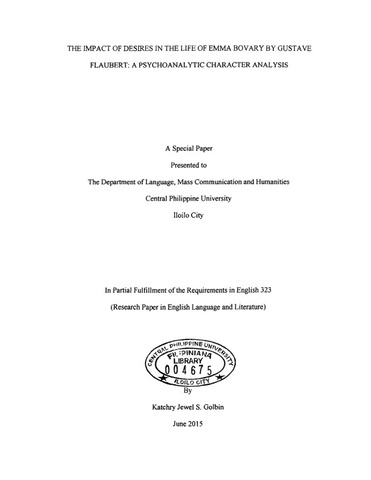Ipakita ang simpleng tala ng item
The impact of desires in the life of Emma Bovary by Gustave Flaubert: A psychoanalytic character analysis
| dc.contributor.adviser | Cagasan, Bernardo G. | |
| dc.contributor.author | Golbin, Katchry Jewel S. | |
| dc.date.accessioned | 2023-09-28T07:51:07Z | |
| dc.date.available | 2023-09-28T07:51:07Z | |
| dc.date.issued | 2015-06 | |
| dc.identifier.citation | Golbin, K. J. S. (2015). The impact of desires in the life of Emma Bovary by Gustave Flaubert: A psychoanalytic character analysis [Unpublished special paper]. Central Philippine University. | en_US |
| dc.identifier.uri | https://hdl.handle.net/20.500.12852/2805 | |
| dc.description | Abstract only | en_US |
| dc.description.abstract | This study focused on the psychological analysis of the main character of Gustave Flaubert’s Madame Bovary in the light of Lacanian theory of lack and desire. Through the character of Emma Bovary, the working of Lacanian desire in the novel was analyzed. The main character’s efforts to reach at the stage of complete serenity and plenitude are focused with the motive of showing her desperation for fulfilling her vague desires. Three major relationships of her life were analyzed in order to depict the transient nature of her objects of desire. The study found that in line with Lacan theory, he believes that the subject can never be ‘whole’ because the subject is all about something lacking. “The subject is made up of absent objects, of things missing and lost, and often imagined by the subject to reside in others. Objects circulate around the subject and only achieve a proper resting place in death” as happens with Emma Bovary. In Madame Bovary says Vargas Llosa, “Emma’s drama is the gap between illusion and reality, the distance between desire and its fulfilment. On two occasions she is persuaded that adultery can give her the splendid life that her imagination strains, and both times she is left feeling disappointed.” The study found that Emma indulges in adultery, makes sexual relationships with her lovers, in a futile hope of getting back that lost unity and oneness but always receives disappointment in turn. Neither two of her lovers were able to fulfil her and make her ‘whole’. | en_US |
| dc.format.extent | vi, 74 leaves | en_US |
| dc.language.iso | en | en_US |
| dc.subject.lcc | P 91.5 .P6 .G65 2015 | en_US |
| dc.subject.lcsh | Bovary, Emma (Fictitious character) | en_US |
| dc.subject.lcsh | Flaubert, Gustave, 1821-1880 | en_US |
| dc.subject.lcsh | Psychoanalytic interpretation | en_US |
| dc.subject.lcsh | Biography as a literary form | en_US |
| dc.subject.lcsh | Discourse analysis, Literary--Psychological aspects | en_US |
| dc.title | The impact of desires in the life of Emma Bovary by Gustave Flaubert: A psychoanalytic character analysis | en_US |
| dc.type | Special paper | en_US |
| dcterms.accessRights | Not publicly accessible | en_US |
| dc.description.bibliographicalreferences | Includes bibliographical references | en_US |
| dc.contributor.chair | Gotico, Sharlene | |
| dc.contributor.committeemember | Cagasan, Bernardo G. | |
| dc.contributor.department | Department of Languages, Mass Communication and Humanities | en_US |
| dc.description.degree | Bachelor of Arts major in English | en_US |


